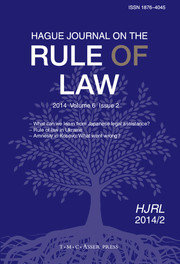Article contents
Local Accounts of Rule of Law Aid: Implications for Donors
Published online by Cambridge University Press: 16 April 2013
Extract
Law and development has a very long history. The export of legal reforms based on Western legal models to enable trade and commerce thrived in the colonial period. During the 1960s and 1970s the USA led a then ‘new’ law and development movement exporting American law, ostensibly to foster liberalism and democratic institutions, and forestall the spread of communism. Although the Cold War was essentially a contest between two economic systems and this first moment in law and development was highly ideological, it was arguably not immediately ‘concerned with any specifically economic functions of law. It reflected a broader, more socially than economically inflected, conception of the importance of law in modernization processes.’ After its robust critique, as a failed political experiment, and after the end of the Cold War, law and development was reclaimed and openly acknowledged as a strategy critical to the development of markets. By the 1990s law and development was ‘explicitly’ linked to market-led development, and later social ambitions were introduced. Concurrently, many donors adopted the rule of law as the focus of their projects, aiming to see legal systems reformed to include independent courts capable of protecting businesses and citizens from discretionary use of power.
Keywords
- Type
- Articles
- Information
- Copyright
- Copyright © T.M.C. Asser Press and the Authors 2013
- 9
- Cited by




